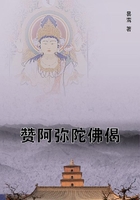The state after death thus imagined by the Hindu philosophers has a certain analogy to the purgatory of the Roman Church; except that escape from it is dependent, not on a divine decree modified, it may be, by sacerdotal or saintly intercession, but by the acts of the individual himself; and that while ultimate emergence into heavenly bliss of the good, or well-prayed for, Catholic is professedly assured, the chances in favour of the attainment of absorption, or of Nirvana, by any individual Hindu are extremely small.
"That part of the then prevalent transmigration theory which could not be proved false seemed to meet a deeply felt necessity, seemed to supply a moral cause which would explain the unequal distribution here of happiness or woe, so utterly inconsistent with the present characters of men." Gautama "still therefore talked of men's previous existence, but by no means in the way that he is generally represented to have done." What he taught was "the transmigration of character."
He held that after the death of any being, whether human or not, there survived nothing at all but that being's "Karma," the result, that is, of its mental and bodily actions. Every individual, whether human or divine, was the last inheritor and the last result of the Karma of a long series of past individuals--"a series so long that its beginning is beyond the reach of calculation, and its end will be coincident with the destruction of the world." (Rhys Davids, Hibbert Lectures, p. 92.)
In the theory of evolution, the tendency of a germ to develop according to a certain specific type, e.g. of the kidney bean seed to grow into a plant having all the characters of Phaseolus vulgaris, is its "Karma." It is the "last inheritor and the last result" of all the conditions that have affected a line of ancestry which goes back for many millions of years to the time when life first appeared on the earth. The moiety B of the substance of the bean plantis the last link in a once continuous chain extending from the primitive living substance: and the characters of the successive species to which it has given rise are the manifestations of its gradually modified Karma. As Prof. Rhys Davids aptly says, the snowdrop "is a snowdrop and not an oak, and just that kind of snowdrop, because it is the outcome of the Karma of an endless series of past existences."
"It is interesting to notice that the very point which is the weakness of the theory--the supposed concentration of the effect of the Karma in one new being--presented itself to the early Buddhists themselves as a difficulty. They avoided it, partly by explaining that it was a particular thirst in the creature dying (a craving, Tanha, which plays other wise a great part in the Buddhist theory) which actually caused the birth of the new individual who was to inherit the Karma of the former one. But, how this too place, how the craving desire produced this effect, was acknowledged to be a mystery patent only to a Buddha." (Rhys Davids, Hibbert Lectures, P. 95.)
Among the many parallelisms of Stoicism and Buddhism, it is curious to find one for this Tanha, "thirst," or "craving desire" for life.
Seneca writes : "Si enim ullum aliud est bonum quam honestum, sequetur nos aviditas vitae aviditas rerum vitam instruentium: quod est intolerabile infinitum, vagum."
"The distinguishing characteristic of Buddhism was that it started a new line, that it looked upon the deepest questions men have to solve from an entirely different standpoint. It swept away from the field of its vision the whole of the great soul theory which had hitherto so completely filled and dominated the minds of the superstitious and the thoughtful alike. For the first time in the history of the world, it proclaimed a salvation which each man could gain for himself and by himself, in this world, during this life, without any the least reference to God, or to Gods, either great or small. Like the Upanishads, it placed the first importance on knowledge; but it was no longer a knowledge of God, it was a clear perception of the real nature, as they supposed it to be, of men and things. And it added to the necessity of knowledge, the necessity of purity, of courtesy, of uprightness, of peace and of a universal love far reaching, grown great and beyond measure."
The contemporary Greek philosophy takes an analogous direction.
According to Heracleitus, the universe was made neither by Gods nor men; but, from all eternity, has been, and to all eternity, will be, immortal fire, glowing and fading in due measure. (Mullach, Heracliti Fragmenta, 27.) And the part assigned by his successors, the Stoics, to the knowledge and the volition of the "wise man" made their Divinity (for logical thinkers) a subject for compliments, rather than a power to be reckoned with. In Hindu speculation the "Arahat," still more the "Buddha," becomes the superior of Brahma; the stoical "wise man" is, at least, the equal of Zeus. Berkeley affirms over and over again that no idea can be formed of a soul or spirit--"If any man shall doubt of the truth of what is here delivered, let him but reflect and try if he can form any idea of power or active being; and whether he hath ideas of two principal powers marked by the names of will and understanding distinct from each other, as well as from a third idea of substance or being in general, with a relative notion of its supporting or being the subject of the aforesaid power, which is signified by the name soul or spirit.
This is what some hold but, so far as I can see, the words will, soul, spirit, do not stand for different ideas or, in truth, for any idea at all, but for something which is very different from ideas, and which, being an agent, cannot be like unto or represented by Any idea whatever [though it must be owned at the same time, that we have some notion of soul, spirit, and the operations of the mind, such as willing, loving, hating, inasmuch as we know or understand the meaning of these words".













